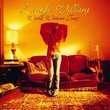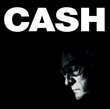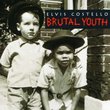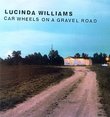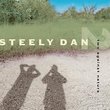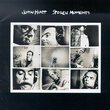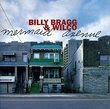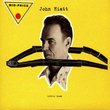| All Artists: Joe Henry Title: Scar Members Wishing: 1 Total Copies: 0 Label: Fontana Mammoth Release Date: 5/15/2001 Genres: Country, Alternative Rock, Folk, Pop, Rock Styles: Americana, Singer-Songwriters, Adult Alternative, Singer-Songwriters Number of Discs: 1 SwapaCD Credits: 1 UPCs: 720616550729, 4029758175729 |
Search - Joe Henry :: Scar
 | Joe Henry Scar Genres: Country, Alternative Rock, Folk, Pop, Rock
From roots rocker to songwriting impressionist to sonic adventurer, the musical progression of Joe Henry resists category and defies expectation. The album-opening "Richard Pryor Addresses a Tearful Nation" is Henry's most... more » |
Larger Image |
CD DetailsSynopsis
Amazon.com From roots rocker to songwriting impressionist to sonic adventurer, the musical progression of Joe Henry resists category and defies expectation. The album-opening "Richard Pryor Addresses a Tearful Nation" is Henry's most audacious move to date, as his smoky voice channels the comedian's tragic spirit while a saxophone break from free-jazz titan Ornette Coleman provides achingly poignant punctuation. The rest of the song cycle ranges from the sophisticated atmospherics of "Stop" (adapted by Henry's sister-in-law Madonna into her hit single, "Don't Tell Me") to the insistent funk of "Rough and Tumble." The production by Henry and Craig Street gives the music plenty of room to breathe, augmenting the organic interplay of guitarist Marc Ribot, pianist Brad Mehldau, and bassist Me'shell Ndegeocello with bittersweet string arrangements. Though there are echoes of Van Morrison in "Mean Flower" and the Band in "Cold Enough to Cross," Henry is less a classicist than a restless visionary. --Don McLeese Similarly Requested CDs
|
CD ReviewsDripping with atmosphere Jonathan B Whitcomb | New Hampshire USA | 06/11/2001 (5 out of 5 stars) "Sometimes I like listening to bright, sunny pop music. When I feel like that, I won't be reaching for this CD. This is dark, ponderous music. Henry easily hops from one pop idiom to another, borrowing lush jazz textures here, trip hop grooves there, loose, rootsy folk rock elsewhere. While anyone can go genre shopping, the trick is to make it hold together. Joe Henry has succeeded brilliantly with this album.This is my second exposure to Joe Henry. I thought "Fuse" was an interesting album but it didn't feel very grounded or coherent in its lighter pop stylings. Moreover, Henry's vocal style sounds more at home in Scar's darker arrangements. Scar goes deeper and feels like an artist hitting his stride. The album feels loose and experimental at the same time it feels confident and assured. It sounds like Henry gave his session musicians space to experiment so this has the feel of a collaberation, all the while guided by Henry's vision. This album has good songs, good singing, good arrangements and good performances. If you're looking for an entertaining ride outside the mainstream, step right up!" The Equal of "Fuse"? doctord462 | East Lansing, MI | 05/16/2001 (5 out of 5 stars) "Joe Henry's 'Fuse' was one of 1999's best albums (in the top five in the New York Times Critics' Poll); with 'Scar,' Henry has created a worthy follow-up. The new album is darker than 'Fuse,' and the songs are mostly slower (a notable exception is "Mean Flower"). Ornette Coleman, Marc Ribot, and percussionist Brian Blade help out, with several solos by Coleman appearing throughout the album. The songs themselves are excellent. The title track, in particular, may be Henry's best song. "Richard Pryor Addresses a Tearful Nation" is another standout. The album is not quite perfect; the instrumental "Nico Lost One Small Buddha" is jarring in context with the rest of the album. In the end, though, 'Scar' is one of Henry's best efforts to date, and nearly the equal of 'Fuse.'" Joe Henry:From Folk to Funk Gianmarco Manzione | Tampa, FL USA | 05/17/2001 (4 out of 5 stars) ""Scar" captures Joe Henry's ability to incorporate unexplored and seemingly foreign genres into his own musical vision. After his slick 80's debut, he turned to the stripped bare folk style for exclusively "live" studio performances. He risked alienating his fans with "trampoline" and the brilliant "Fuse" by introducing elaborate, lush pop rhythms to his music, and the results lept well beyond all expectations. Ornette Coleman's hand touches "Scar" with a magic pathos. The title track is indeed one of Joe Henry's finest performances, which is less a song than it is an eerie and gorgeous suggestion of a darker Heaven. "Richard Pryor Addresses a Tearful Nation" can be seen as a darker and more compelling sequel to the heavenly ballad, "One Day When The Weather Is Warm," the opening song on Henry's subdued 1993 effort, "Kindness of the World." The song's blend of jazz piano, clarinet, sensuously torpid hip-hop drum beats and Henry's unmistakable vocals is further proof that Henry's "Fuse" was no fluke, nor was it an embarrassing or desperate cross-over into the realm of pop music for the sake of record sales, as some critics would have you believe. "Scar" is absolutely necessary in this regard, as it proves that Henry is blessed with a genuine musical vision, one that evolves on every record. As a fan who was won over by Fuse, I confess to hoping for something very much in the same vein this time around, something that elaborated upon the riveting pop soundscape of that album. However, after hearing the jazzy tunes on "Scar," it is apparent that Joe Henry commands a level of respect that his critics failed to allow him earlier. Indeed, had Henry delivered another pop record such as Fuse, he may have risked the kind of sterility and predictability that some spend decades avoiding, such as Neil Young. The album's first single, "Stop," is another great song, serving as a kind of funky interpretation of Tom Waits, with guitar licks that recall Waits's "Jockey Full Of Bourbon," and offering some of the album's most exciting percussion. Edgar Bergen matches that excitement with violent string arrangements that punch through the song like bolts of lightning. Nico Lost One Small Buddha is the only track here, however, that recalls the somewhat louder guitar work on Fuse, or on trampoline's "Let Me Have It All." While the pop rhythms on Fuse take a back seat to acoustics, jazz and subtle hip-hop beats on "Scar," this album enjoys the prestige of standing on its own two feet, rather than on those already firmly planted by its predecessor of two years ago. "Scar" requires that veteran fans adjust their musical palates yet again, but just as on the other incarnations of Joe Henry, this one is worth the work."
|

 Track Listings (10) - Disc #1
Track Listings (10) - Disc #1